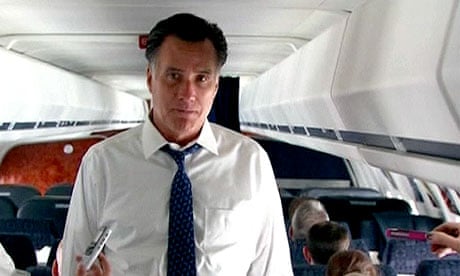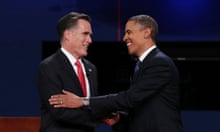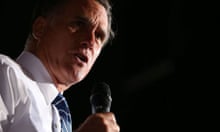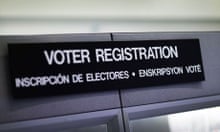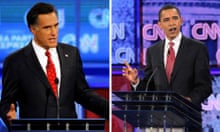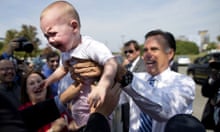On Friday morning, Politico ran an article that chiefly attributed President Obama's lead to Mitt Romney and his failures. Salon's Steve Kornacki came to the opposite conclusion and concludes that the fundamentals of this cycle made Romney's task of deposing Obama quite difficult. So, which is it?
There are really two ways to measure the fundamentals: approval ratings and economic statistics. Both metrics try to assess how the contest stands without taking into account the opposing candidate's characteristics. Approvals incorporate other factors, such as an incumbent's strengths on other issues unrelated to the economy.
Before the campaign really got under way, in April and May, Obama's average Gallup approval rating was 47%. That figure of 47% isn't great – but it's not bad, either. During the past 11 elections where an incumbent ran for re-election and there was a Gallup poll (all since 1940, save 1944), there has been a statistical trend for the president's approval rating to rise during the campaign.
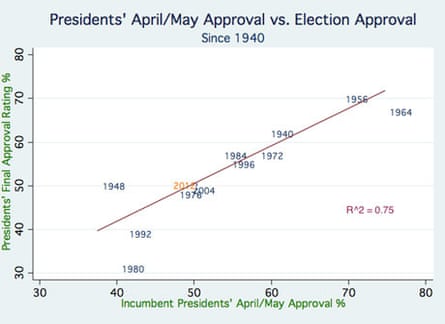
Obama's Gallup approval rating has risen to about 49.7% since the conventions. If that holds through the election, it's right about where we would expect Obama's final approval to be, given his April/May approval, based on the out-of-sample prediction from the previous 11 elections. In other words, by this measure, any effect Romney's ineptness might have had is minimal.
We can also predict Obama's margin of victory from his April/May approval rating. A 47% approval in April/May forecasts Obama to win the election by 3.4 percentage points.
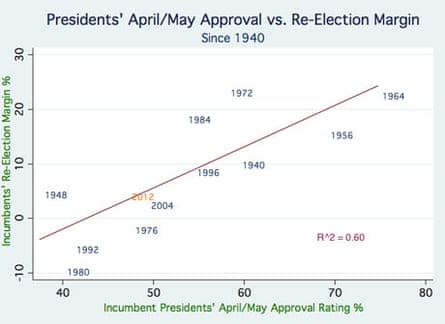
Obama's average lead over the past three weeks of Gallup polling is 4 percentage points. Obama's right where he should be, then, based on his approval when the campaign began. In fact, despite being out-of-sample, Obama's fits the line the best out of any of the data points.
Some might say that Obama's approval is based in part on his high favorability. Thus, a stronger opponent could have knocked Obama a peg or two, particularly with a strong economic case.
Measuring the economy is difficult to do because there are many different metrics and they often diverge. Also, many economy-based models include other factors not related to the economy.
Bob Erikson and Chris Wlezien get around this messiness by turning to a leading economic indicator growth variable that incorporates ten economic statistics. A model based off only this economic index for every election since 1952 predicts that President Obama should win the election by 5 points. In other words, even the economy paints Obama as a favorite. This figure not incidentally matches the margin that a model based on November Gallup approval would estimate, given Obama's 50% approval rating.
Much of the reasoning that the state of the economy made Obama the underdog derives from a misunderstanding of how the economy relates to presidential elections. Many people look only at the absolute statistics – but it is growth, specifically late growth, that is most important. Other models are solid, but aren't purely based on economic measures. Looking at an ensemble of these forecasts collected created by Jacob Montgomery, Florian Hollenbach and Michael Ward, Obama is still favored to win 60% of the time.
So what about the idea that Mitt Romney is supposedly a dismally poor candidate? We can measure Romney's crumminess by examining his favorable ratings. I dug through the Roper archives and found three pollsters with favorable ratings taken during the final week of the campaign dating back to at least 1992. Gallup has favorables since 1988. CBS goes back to 1980. From each of these pollsters, I took the tightest screen (that is, likely voters when available or possibly estimated).
The result is that Romney's favorables are bad, but probably not the worst of any recent presidential candidate. Romney's latest net favorable (favorable minus unfavorable) in the CBS poll is -1 percentage point. If that holds through the election, there have been eight major party candidates with an equal or worse favorable rating since 1980, including Jimmy Carter, Walter Mondale, Michael Dukakis, Bill Clinton, Bob Dole, John Kerry, and John McCain.
Romney's net favorables rank worse historically in Gallup and NBC/Wall Street Journal's polls. Even then, his Gallup +2 net favorable is better than either Michael Dukakis's in 1988 and George HW Bush's in 1992 at the end of the campaign. NBC/Wall Street Journal -5 net favorable rating is equal to President George HW Bush's in 1992. Romney's net favorables would, no doubt, be better than Democratic presidential candidates were in the 1980s if these pollsters surveyed voters in the 1980 and 1984. As I said, Romney is not viewed favorably, but his deficit is not historically exceptional.
Part of the reason that many think Romney's poor standing is historic is because Pew Research's data has said it is. The problem, in my opinion, is that Pew is mixing its data from this year with Gallup's from the past. Pew has been consistently one of the more favorable pollsters for President Obama in 2012.
What is often not discussed is that despite a reputation as likable figure, Obama's net favorables are actually quite low compared to past candidates. According to CBS, eight presidential candidates since 1980 had an equal or better net favorable at the end of the campaign than Obama does right now. Nine since 1988 had an equal or better favorable rating than Gallup found in their last poll. Six since 1992 had a better favorable per NBC data.
Why are both Obama and Romney's favorable ratings so low? It could be that the electorate is more polarized than at any point in the last 25 years.
The way we can really compare 2012 to prior years is to look at the difference between the candidates' favorability. The difference in the net favorables of the candidates in CBS's data among likely voters is smaller than in every other election since 1980. The gap in 2012 tied for the second smallest next to 2004 according to Gallup. For NBC, it is in the middle of the pack. In other words, 2012 should be a close to moderate victory for Obama based off past data.
Another key point is that Romney's favorability "problem" may itself be determined by the fundamentals. Favorable ratings don't happen in a shell: people's view about a challenger relates at least partially to whether they like the job the incumbent is doing.
Not surprisingly, then, when incumbents run for re-election, the favorability gap in the late stages of the campaign is tied to an incumbent's approval rating in April and May. I went back in the Roper archive and plotted the incumbent's approval rating against the favorability gap in the final months since 1980.
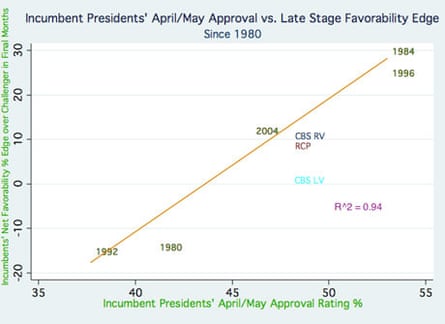
There are only five observations from past years, so caution must be taken, but the trend is pretty clear. In fact, 94% of the favorability gap in the final months of the campaign is explained by the president's approval back in April and May. Because Obama's approval in CBS's lone April/May poll was 48%, Obama is estimated to have a net favorability edge of 13 points over Romney. Obama's lead in net favorables among registered voters was 11 points in CBS's last poll, is about 9 points in the Real Clear Politics average, and was only 1 point in the last CBS poll among likely voters.
In short, Romney's favorability problem seems either well predicted by Obama's approval strength before the campaign started or actually not anywhere near as bad as might have been expected.
There is no proof here that Romney is losing because he's a weak candidate. Romney's problem with the electorate probably has little to do with Romney himself. The reason Romney has struggled is that Obama was in a relatively strong position, thanks in part to economic growth, before many voters could even form an opinion about him.
